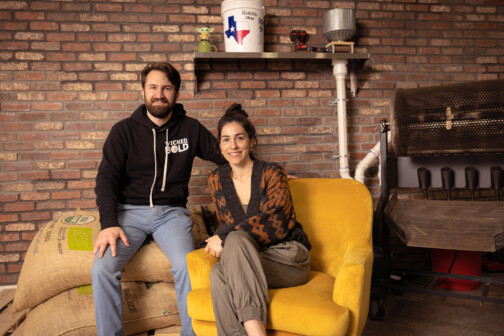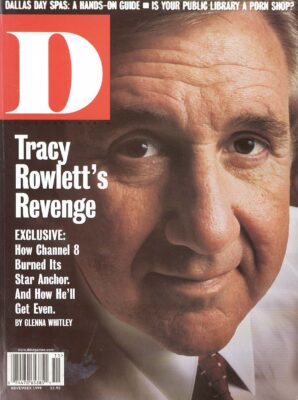The crowd of 350 suits moved among the dozens of tables, bracing for one of those sleep-inducing awards luncheons that begin cluttering business calendars after Labor Day. As waiters and waitresses buzzed around them like bees in a clover patch, the business types engaged in the requisite handshaking and networking while half-listening to the standard sponsor thank-you’s and speeches.
The event’s title was more of a mouthful than the spinach-stuffed chicken something-or-other they served in the Crystal Ballroom, one of those large Hotel Inter-Intercontinental meeting rooms that require a map to find. The event was The Greater Dallas Chamber of Commerce 1999 International Business Achievement Award. Now in its fourth year, the award pays tribute to “companies that exemplify the international entrepreneurial spirit of the greater Dallas Community,” as the brochure so elegantly informed.
This event isn’t about such multinational household names as Exxon, EDS, and American Airlines, however. This is about thousands of smaller Dallas-based companies with annual revenues less than $75 million, and that have found highly lucrative niches outside the borders of Texas and the U.S.
When the time arrived for the award announcement to come crackling over the microphone, the audience was silent: “And this year’s winner is … Panja Inc.”
No, it’s not the latest ethnic restaurant in Addison. The company, which until July went by the nondescript name AMX Corp., derives its name from the Swahili word for machete, a metaphor for its new mission to cut the personal computer out of Internet-based video and audio entertainment.
For now, the 17-year-old company’s primary business remains producing remote control devices for audio-visual presentations. “Walk down the Galleria Mall here in Dallas, for example,” says company president Joe Hardt. “There’s an original Levi’s store there. In the back of that store is a nine-screen video mall. If you go behind the scenes, there’s a system that’s controlling that video wall. We’ve installed those in a hundred or so of those Levi stores.” The company also has installed devices that control the complex audio-video displays at Orlando’s Disney World.
The company’s name change was inspired by a new business unit. Panja will soon be marketing a device similar to a set-top box to connect stereo systems and televisions to the Internet, eliminating the need for a PC. In other words, says Hardt. “right now, people are playing MP3 files on their PCs. We think that is a ludicrous proposition for a non-entertainment device. People already have entertainment devices in their homes. They’re called stereo systems land TVs]. We’re going to get rid of the PC so you can push one button and bring in your MP3 tiles, bring in your
Panja has been doing business in the international marketplace for years, though it’s only recently that its global business has started to take hold. It began with the company’s founder, whose wife is Australian and fell it simply made sense to capitalize on her business contacts Down Under. “We’d hear about a project somewhere else, and we’d start doing business there,” Hardt says. “It became pari of our long-term business strategy.”
To manage up-front capita! costs, Panja partnered with distributors wherever it wanted to do business, similar to creating a regional domestic distribution network. “The way we’ve done it doesn’t really take a large upfront capital commitment because of our partnerships,” Hardt says. “There have been some instances where we’ve gone direct, where it takes a significant up front capital investment. because we really don’t expect those operations to be prolitable for two or three years. And that’s the way it’s worked.”
Those local distributors in turn have brought in projects in which Panja otherwise would not have been able to participate. For example, the company installed a camera control system at the central police station in Beijing. “Selling in China is a pretty difficult proposition if you’re not part of the local community.” Hardi says, “So by having a Chinese partner representing us, we’re able to sell to the police department in Beijing. With local partners, we’re able to get into opportunities like that.”
Doing business in other countries also allows the company to expand its product line and knowledge. Depending on where Panja does business, regulatory and licensing standards differ. Developing new products to operate in differing environments has enhanced its technological know-how.
Perhaps an unintended byproduct for Panja is its ability to recruit in a tight labor market by offering people opportunities to live and work overseas. “We have people from here that we’ve moved to England on a temporary assignment basis.” says Hardt, “We have an employee that currently lives in Singapore. He previously lived in Germany. He’s a Dallas native and though he’s worked for the same company for 10 years, he’s worked in Dallas, Germany and now Singapore.”
Two years ago, Hardt surveyed his 250 employees (he now has 400) and found that 27 languages were being spoken there. And while it’s rare that he finds new employees who once worked for his local partners, he regularly brings in hundreds of people from around the globe for installation, programming, and system design training.
Panja’s international business has created an enriching environment for its employees, too. “We get to work with people around the world, we get to work on projects around the world,” Hardt says. “We sent a programmer recently to Saudi Arabia to work on the king’s airplane. We’re involved with creating the infrastructure for the Olympics in Australia. It creates a lot of opportunities in a lot of different markets, and you can be involved in a lot of interesting things.”
Hardt has some advice for other business owners thinking about exploring international markets: Don’t be discouraged. “If you commit to it, commit to it. but don’t expect overnight results.”
More important is developing trust with your partners. “There’s not enough paper in the world that can protect you from a crook. You hope you have good business partners that make good judgments, and then you do the best you can.”
He points out that the U.S. population is about 260 million. The global population is 6 billion. “If you just focus on the U.S. market, you’re leaving a lot of opportunities on the table,” he says. “The difficulty is really overrated in that it’s probably not any harder to do business in Australia, for example, than it is in California. In general, if you haven’t done it, it might seem exotic or esoteric, but it’s really not. Just take it one step at a time.”
Panja’s story is typical of the thousands of Dallas companies competing globally, says Sharon Venablc, of the Chamber’s International Trade Department. The reasons these companies are going global, she says, are as diverse as the countries involved:
Political and economic changes over the last few years, both here and abroad, have opened new markets for Dallas companies willing to take the risk.
Dallas-Fort Worth International Airport, helped by the next generation of long-range aircraft, is establishing new non-stop trade routes around the globe through both domestic and foreign flag carriers.
Depending on which study you read, Dallas is now the second or third leading high-tech area in the U.S., which brings foreign companies here to find partners, products, and services.
Foreign companies arc increasingly finding Dallas geographically attractive for their U.S.-based operations, giving local companies opportunities to do business with them here and abroad. In addition, foreign-born nationals working at these companies often spawn businesses that are likely to look homeward for customers.
Business schools throughout the area are emphasizing international business. SMU this fall began a Global Leadership Program. UT-Dallas attracts foreign-born students to its high-tech programs. UT-Southwestern’s reputation in the emerging held of biotechnology is attracting students and companies who want to study and capitalize on its discoveries.
The Greater Dallas Chamber of Commerce, working with the U.S. Department of Commerce, the International Small Business Center, Richardson’s Technology Business Council and its Startech incubator, and the Export-Import bank, has created an infrastructure to help small businesses tap foreign markets.
As a result, Dallas companies are finding their reach is unlimited, Venable says. And that certainly was evident among all those speeches and glad-handing going on at the Hotel Inter-Continental.
Get our weekly recap
Brings new meaning to the phrase Sunday Funday. No spam, ever.
Related Articles

News
Medical City Opens ER in Garland and Local Dermatologist Named Youngest Ever President of the American Academy of Dermatology
Plus Health Wildcatters wins accelerator competition and DFW Hospital Council Foundation awards.
By Bridget Reis

Business
Wicked Bold Chocolate CEO and Comedian Deric Cahill on Why it Pays to Be Funny
The brand leans into humor, but the business' success is no laughing matter, with products in nearly 2,000 retail locations nationwide.
By Will Maddox

D CEO Award Programs
Nominations Open: D CEO’s 2024 Corporate Counsel Awards
The annual program honors top in-house attorneys in Dallas-Fort Worth, from outstanding up-and-comer to outstanding general counsel.


